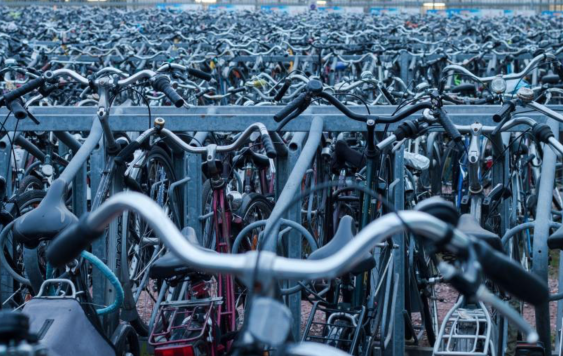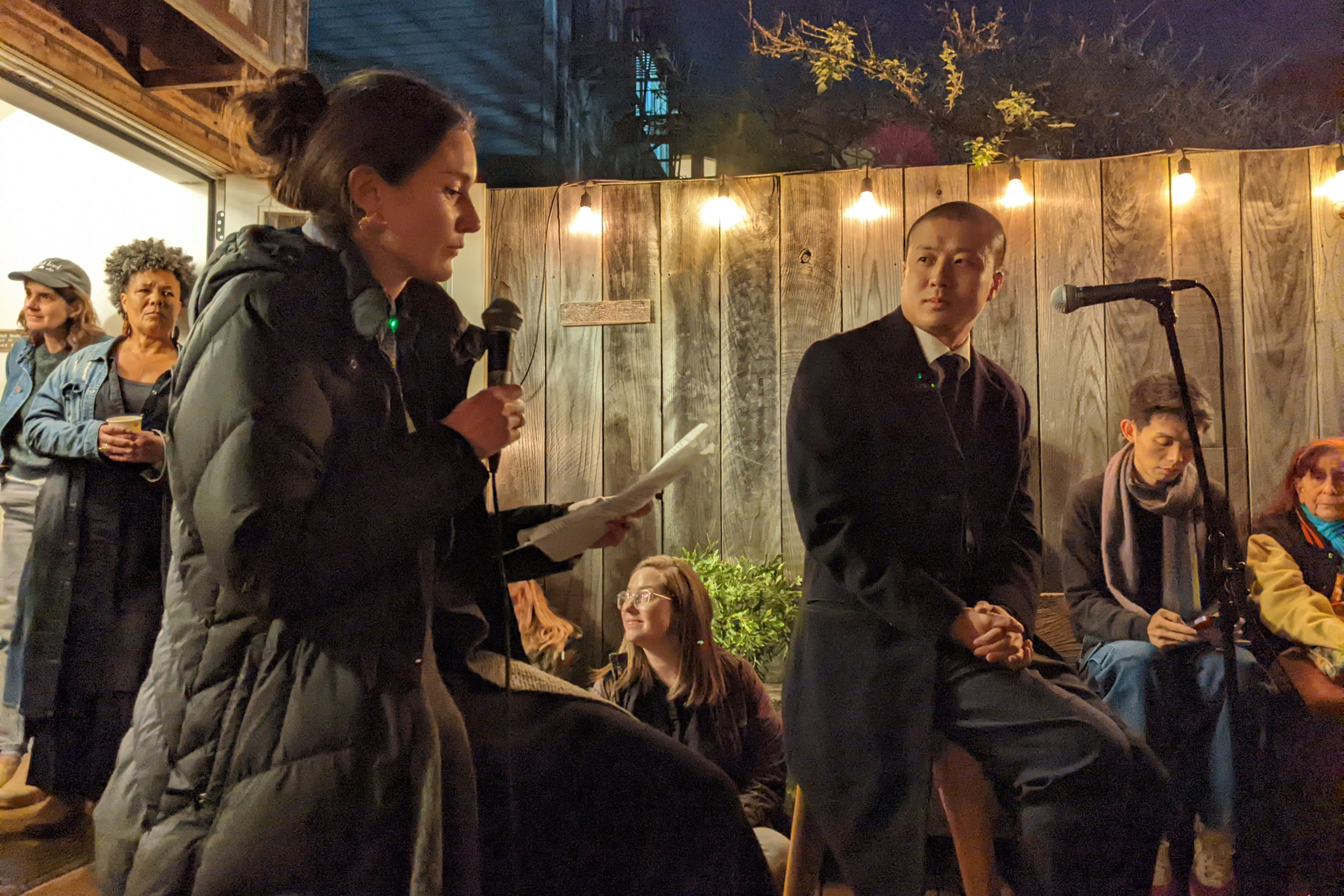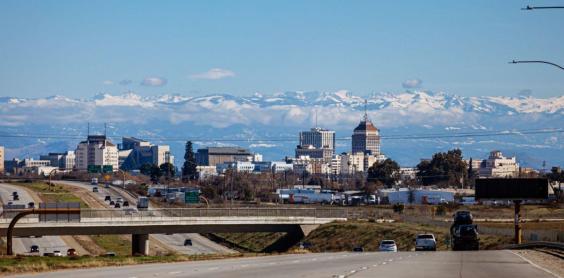 Under the judge's order, the MTA can only install 3.7 of the 14 miles of bike lanes it had hoped to paint in the first year. Flickr photo: Doubletee
Under the judge's order, the MTA can only install 3.7 of the 14 miles of bike lanes it had hoped to paint in the first year. Flickr photo: Doubletee A San Francisco judge issued an order [PDF] modifying the three-year-old bike injunction late Wednesday afternoon, refusing to dissolve it completely, but allowing the "most easily reversible" projects to go forward. It means 10 of the 21 first-year Bike Plan projects -- or about 3.7 miles of new bike lanes -- outlined by the MTA can begin, and when completed, will mark the most significant improvements bicyclists have seen on the streets of San Francisco since the injunction was first issued in June 2006.
"With the huge demand for biking improvements, we're disappointed that the Court didn't completely remove the handcuffs, but we're pleased that some streets can now be improved for biking," said Leah Shahum, Executive Director of the SF Bicycle Coalition. "A three-year backlog means San Francisco has some serious catching up to do and we are eager for this dark cloud over sustainable transportation to be completely lifted."
In his order, Superior Court Judge Peter J. Busch said the completion and certification of the Bike Plan EIR had "changed the circumstances," but he disagreed with the City Attorney's argument "that the proper response is to unconditionally dissolve the injunction" before the outcome of a hearing now set for June to determine if the 2000 page document fully complies with CEQA.
However, Busch said it would be "unreasonable to leave the City completely unable to advance what it has determined is an important policy initiative in light of the changed circumstances," so he modified the injunction, allowing some projects to go ahead.
"This is an important step in the right direction that enables the City to enact significant safety improvements for bicyclists and pedestrians in San Francisco," City Attorney Dennis Herrera said in a statement.
The MTA issued a statement quoting Mayor Gavin Newsom, promising to begin the projects early next week, and provide a time line and schedule Monday.
"While we had hoped for the complete removal of the injunction, this order paves the way for real growth in bicycling in San Francisco," said Newsom.
Most of the projects considered to have "minimal impact to traffic flow and parking loss" outlined in a declaration [PDF] by MTA traffic engineer Damon Curtis, who works in the agency's bicycle program, will be installed in the next year, hopefully by June, with the exception of bike lanes on Fremont Street (from Folsom to Harrison), Kirkham Street (from 6th Avenue to the Great Highway), and Sloat Boulevard (from the Great Highway to Skyline). It's unclear why Busch refused to allow those. The projects that will move forward include new bike lanes on Beale, Howard, Otis, Scott, Mississippi, Kansas, Claremont and Clipper Streets, along with 7th Avenue and JFK Drive.
The authorized projects include a total of about 3.7 miles of bike lanes, compared to the roughly 14 miles the city had originally hoped to paint in the first year. The full bike plan includes 34 miles of new bike lanes. Only one of the authorized projects, JFK Drive, is greater than a half mile in length, while 9 of the 11 first-year projects that are still on hold are greater than half a mile in length, and five of them are greater than a mile in length.
The order also allows the city to install sharrows and hundreds of bike racks, "which is a big deal," said Marc Caswell, the SFBC's program manager. "This is what a lot of bicyclists have been waiting for, a place to park their bikes."
Here's a complete list of the projects the city can begin working on, as well as a list of projects the city had hoped to complete in the first year, but which will remain blocked at least through June 2010. Lengths are included for each project, but we calculated them quickly using Google Maps, so please let us know of any errors.
Bike lanes projects the city is prioritizing for the first year after the injunction is lifted:
• Beale Street southbound bicycle lane, Bryant Street to Folsom Street (Project 2-5) (.2 mi)
• Howard Street westbound bicycle lane at 9th Street (Project 2-8) (<.1 mi)
• Scott Street, northbound left turn bicycle lane, Fell Street to Oak Street (Project 3-5) (<.1 mi)
• Mississippi Street bicycle lanes, 16th Street to Mariposa Street (Project 4-5) (.2 mi)
• Kansas Street bicycle lanes, 23rd Street to 26th Street (Project 5-8) (.3 mi)
• Clipper Street bicycle lanes from Douglass Street to Portola Drive (Project 6-2) (.4 mi)
• 7th Avenue bicycle lanes and sharrows from Lawton Street to Lincoln Way (Project 7-2) (.5 mi including sharrows)
• John F. Kennedy Drive bicycle lanes, Kezar Drive to Transverse Drive (Project 7-4) (1.4 mi)
• Otis Street westbound bicycle lane, Gough Street to South Van Ness Avenue (Project 2-15) (.1 mi)
• Claremont Boulevard bicycle lanes, Dewey Boulevard to Portola Drive (Project 6-1) (.3 mi)
Bike lanes projects the city had prioritized for the first year after the injunction is lifted, but which the injunction will continue blocking:
• Kirkham Street bicycle lanes, 6th Avenue to The Great Highway (with sharrows only between 18th and 20th Avenues) (Project 7-5) (2.5 mi)
• Fremont Street southbound bicycle lane, Folsom Street to Harrison Street (Project 2-7) (.1 mi)
• Sloat Boulevard bicycle lanes, The Great Highway to Skyline Boulevard (Project 8-5) (.6 mi)
• Illinois Street bicycle lanes from 16th Street to Cargo Way (Project 4-3) (1.5 mi)
• Laguna Honda Boulevard bicycle lanes from Clarendon to Woodside Avenue, and from Portola Drive to Woodside Avenue (Projects 6-3 and 6-4) (.7 mi)
• Portola Drive Bicycle Lanes, from Corbett Avenue to O'Shaughnessy Boulevard (Project 6-5) (.6 mi)
• Townsend Street bicycle lanes, 8th Street to The Embarcadero (Project 2-16) (1.2 mi)
• Alemany Boulevard bicycle lanes, Bayshore Boulevard to Rousseau Street (Project 5-2) (1.4 mi)
• Ocean Avenue bicycle lanes, Alemany Boulevard to Lee Avenue (Project 5-9) (.9 mi)
• Potrero Avenue and Bayshore Boulevard bicycle lanes, 25th Street to Cesar Chavez Street (Project 5-11) (.3 mi)
• North Point Street bicycle lanes, The Embarcadero to Van Ness Avenue (Project 1-3) (1 mi)
Updated 9:13 p.m.





